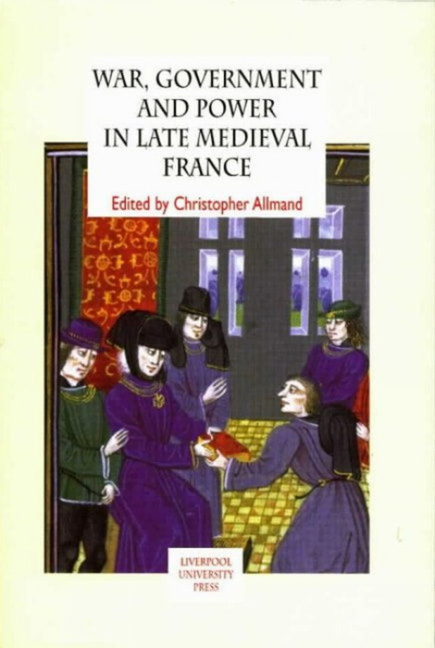Book contents
- Frontmatter
- Contents
- Dedication
- Acknowledgements
- Abbreviations
- Introduction
- 1 From the Court of Hainault to the Court of England: The Example of Jean Froissart
- 2 Froissart and his Second Book
- 3 Alain Chartier and the Arts of Crisis Management, 1417–1429
- 4 Intellectual Patterns and Affective Reactions in Defence of the Dauphin Charles, 1419–1422
- 5 War, Propaganda and Diplomacy in Fifteenth-Century France and England
- 6 History and the Literature of War: The Boke of Noblesse of William Worcester
- 7 Commynes on Kingship
- 8 ‘Centre’, ‘Power’ and ‘Periphery’ in Late Medieval French Historiography: Some Reflections
- 9 Centre and Periphery in Late Medieval France: Tournai, 1384–1477
- 10 ‘Decayed Feudalism’ and ‘Royal Clienteles’: Royal Office and Magnate Service in the Fifteenth Century
- 11 Justification and Theory of the Death Penalty at the Parlement of Paris in the Late Middle Ages
- 12 Membra disjecta of the Breton Chambre des Comptes in the Late Middle Ages: Treasures Revisited and Rediscovered
- Glossary
- Index
12 - Membra disjecta of the Breton Chambre des Comptes in the Late Middle Ages: Treasures Revisited and Rediscovered
- Frontmatter
- Contents
- Dedication
- Acknowledgements
- Abbreviations
- Introduction
- 1 From the Court of Hainault to the Court of England: The Example of Jean Froissart
- 2 Froissart and his Second Book
- 3 Alain Chartier and the Arts of Crisis Management, 1417–1429
- 4 Intellectual Patterns and Affective Reactions in Defence of the Dauphin Charles, 1419–1422
- 5 War, Propaganda and Diplomacy in Fifteenth-Century France and England
- 6 History and the Literature of War: The Boke of Noblesse of William Worcester
- 7 Commynes on Kingship
- 8 ‘Centre’, ‘Power’ and ‘Periphery’ in Late Medieval French Historiography: Some Reflections
- 9 Centre and Periphery in Late Medieval France: Tournai, 1384–1477
- 10 ‘Decayed Feudalism’ and ‘Royal Clienteles’: Royal Office and Magnate Service in the Fifteenth Century
- 11 Justification and Theory of the Death Penalty at the Parlement of Paris in the Late Middle Ages
- 12 Membra disjecta of the Breton Chambre des Comptes in the Late Middle Ages: Treasures Revisited and Rediscovered
- Glossary
- Index
Summary
The dramatic story of how Héracle-Olivier-Jean-Baptiste de Blocquel de Croix, Baron de Wismes and his friend, Arthur Le Moyne de la Borderie, later the outstanding nineteenth-century historian of Brittany, discovered and rescued a small part of the archives of the former Breton Chambre des Comptes in 1857 was told two years later in a fascinating article, ‘Le Trésor de la rue des Caves à Nantes’. While walking past an old house, de Wismes recalled, ‘j'aperçus deux ou trois individus accroupis près d'un puits situé dans l'angle de la cour de cette maison et occupés à laver des piles de vieux parchemins’ (‘I saw two or three individuals squatting near a well by the corner of this house, all busily engaged in washing piles of old parchment’). Overcome with curiosity, he entered the court, to be met by a man from Alsace, who showed him three rooms full of drying parchments. Recognising that many were medieval, de Wismes struck a bargain, offering to buy documents at two francs a pound. The deal completed, he carried home several kilos, and then immediately wrote to his friend La Borderie about his find, offering to share future spoils with him. A few days later, together they returned to repeat the procedure:
Qu'est-ce donc, en effet, cette feuille que je tiens entre les mains? Ne sont-ce point les comptes de quelque belle campagne du grand connétable, notre duc Arthur de Richemont? Et vous, La Borderie, quelle attention soutenue! quels regards flamboyants! que fixez-vous donc ainsi? Mais vraiement, votre admiration ne m’étonne pas, je reconnais la signature de notre grande duchesse Anne. C'est un état de dépense de sa maison qu'elle a voulu approuver ellemême. Du reste, il n'est presque pas un de nos ducs, dont nous ne retrouvons ici une partie des comptes pendant le cours des XIVe et XVe siècles …
What is this sheet which I am holding in my hands? Aren't they the accounts of some fine campaign of the great constable, our duke, Arthur de Richemont? And you, La Borderie, what unremitting attention, what intense looks, what are you looking at in this way? Decidedly, your admiration does not surprise me; I recognise the signature of our beloved Duchess, Anne.
- Type
- Chapter
- Information
- War, Government and Power in Late Medieval France , pp. 209 - 220Publisher: Liverpool University PressPrint publication year: 2000

